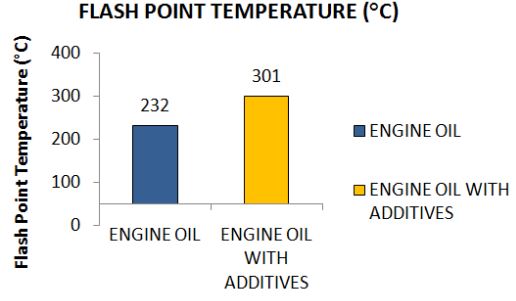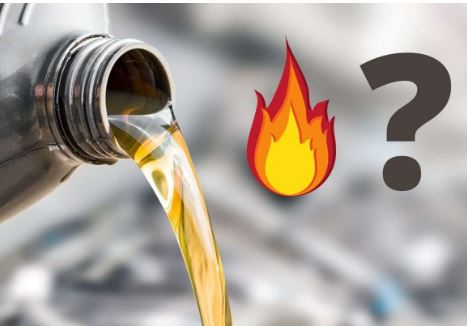If you’re a car owner, you’re probably aware of the importance of engine oil for keeping your engine running smoothly. However, have you ever wondered if this oil is flammable? This is a crucial question to ask, as it can affect the safety of both you and your vehicle. In this blog post, we’ll delve into the question “Is engine oil flammable?” and provide you with all the information you need to know. Read on to learn more about the flammability of engine oil and how to handle it safely.
The Composition of Engine Oil

- Base oil: This is the main component of this oil, and it makes up about 75-90% of the total volume. Base oil is typically derived from crude oil, but synthetic oils are becoming increasingly popular.
- Additives: It contains various additives that help to improve its performance. These additives include detergents, dispersants, anti-wear agents, and viscosity improvers.
- Friction modifiers: These additives are used to reduce friction between moving parts in the engine, which helps to improve fuel efficiency and reduce wear and tear.
- Anti-foaming agents: These additives are used to prevent the formation of foam in the oil, which can reduce its lubricating properties.
The Flash Point of Engine Oil

One of the most important factors in determining whether a substance is flammable or not is its flash point. The flash point is the lowest temperature at which a liquid can produce enough vapor to ignite when exposed to an ignition source. For engine oil, the flash point can vary depending on the type and manufacturer, but it typically falls within the range of 300 to 495 degrees Fahrenheit (150-260 degrees Celsius).
It’s important to note that while this oil has a flash point above 199.4 degrees Fahrenheit (93 degrees Celsius), which is the threshold for flammable liquids according to the Occupational Safety and Health Organization (OSHA), it is still considered a combustible liquid. This means that it can still ignite and burn under certain conditions, but requires a higher temperature or ignition source than a flammable liquid.
The flash point of engine oil is an important consideration when it comes to storage and handling. If the oil is stored at a temperature above its flash point, it can increase the risk of ignition and fire. It’s also important to be aware of any ignition sources, such as hot surfaces or electrical equipment, that may be present in the storage or handling area.
The ignition temperature of engine oil is also an important factor to consider. This is the temperature at which the oil will actually catch fire and start burning. For this oil, the ignition temperature typically falls within the range of 300 to 400 degrees Fahrenheit (149-204 degrees Celsius).
Is Engine Oil Flammable?

This oil is a crucial component of any vehicle, responsible for lubricating and protecting the engine’s moving parts. However, many people wonder whether engine oil is flammable or not. The good news is that this oil is not considered flammable.
According to the Occupational Safety and Health Administration (OSHA), flammable liquids are those that have a flash point below 100 degrees Fahrenheit. The flash point is the temperature at which a liquid gives off enough vapor to ignite in the presence of a spark or flame. This oil typically has a flash point of around 400 degrees Fahrenheit, which is well above the threshold for flammability.
While engine oil is not technically flammable, it can still pose a fire hazard if not handled properly. If engine oil is heated to its flash point, it can catch fire and cause serious damage. It’s important to always handle this oil with care and follow proper safety procedures when working with it.
In the event of an engine oil fire, it’s important to use a Class B fire extinguisher. Class B extinguishers are specifically designed to put out fires caused by flammable liquids like gasoline, diesel fuel, and oil. Using the wrong type of extinguisher can actually make the fire worse, so it’s important to use the right one.
Safety Precautions When Handling Engine Oil

- Store it in a cool, dry, and well-ventilated area away from heat sources, sparks, and flames.
- Do not smoke or use open flames near engine oil.
- Use a funnel when pouring engine oil to avoid spills.
- Wipe up any spills immediately with an absorbent material and dispose of it properly.
- Do not mix different types of engine oil or use engine oil that has been contaminated with water or other fluids.
- Dispose of used engine oil properly by taking it to a recycling center or a service station that accepts used oil.
Ignition temperature of engine oil
The ignition temperature of this oil refers to the temperature at which the oil will start to ignite and burn. This is an important characteristic of this oil, as it can affect engine performance, safety, and longevity. In this blog section, we will discuss the definition of ignition temperature, how it is measured, and the interpretation of ignition temperature results.
Definition of Ignition Temperature:
The ignition temperature of a substance is the lowest temperature at which it will spontaneously ignite and start to burn. For engine oil, the ignition temperature is a critical property that reflects the oil’s ability to withstand high temperatures without breaking down or catching fire. A high ignition temperature indicates that the oil is less likely to burn and break down under high-temperature conditions.
How Ignition Temperature is Measured:
The most common method for measuring the ignition temperature of engine oil is the Cleveland Open Cup (COC) test. This test involves heating a small sample of the oil in a cup until it ignites. The temperature at which the oil ignites is recorded as the ignition temperature.
The COC test is a widely accepted method for measuring the ignition temperature of engine oil, and it provides reliable results. However, it is important to note that the COC test does not simulate the actual conditions that this oil will experience in an engine. Therefore, the results should be interpreted with caution.
The Ignition Temperature of Engine Oil:
The ignition temperature of this oil can vary depending on the type of oil, additives, and other factors. Generally, synthetic oils have a higher ignition temperature than mineral oils. This is because synthetic oils are designed to withstand high-temperature conditions and have a more uniform molecular structure.
Interpretation of Ignition Temperature Results
The ignition temperature results can provide valuable information about the performance and safety of the engine oil. A high ignition temperature indicates that the oil is less likely to break down or catch fire under high-temperature conditions, which can extend the life of the engine and reduce the risk of accidents.
However, it is important to note that the ignition temperature is just one of many factors that affect the performance of engine oil. Other factors, such as viscosity, lubrication, and wear protection, also play important roles in engine performance and longevity.
Why engine oil can catch fire

This oil is a critical component in the proper functioning of an engine, but it can also pose significant risks if not handled correctly. One of the most significant risks associated with engine oil is the potential for fires. These oil fires can be caused by a variety of factors, including:
Causes of engine oil fires
- Overheating of the engine or oil
- Leaking oil onto a hot surface, such as the exhaust manifold or catalytic converter
- Spilled oil coming into contact with a spark or open flame
- Improperly stored oil, leading to oxidation or contamination
Prevention of engine oil fires
- Regular maintenance of the engine to prevent overheating and leaks
- Proper storage of oil in cool, dry places away from potential ignition sources
- Using appropriate containers for transporting and storing oil
- Keeping a fire extinguisher nearby when working with oil
Risks of engine oil fires
- Personal injury, including burns and respiratory issues
- Damage to property, such as vehicles, buildings, and equipment
- Environmental damage from oil spills and fires
To handle engine oil safely and prevent fires, it’s important to follow proper procedures, such as:
- How to handle engine oil safely
- Use Personal Protective Equipment (PPE), such as gloves and goggles
- Clean up any oil spills immediately
- Dispose of used oil properly and promptly
- Avoid smoking or using open flames in areas where oil is being used or stored
Engine oil can also have a significant impact on the environment if not handled properly. Some of the environmental concerns associated with engine oil include:
- Engine oil and the environment
- Pollution of waterways and soil from oil spills
- Contamination of air from burning oil
- Harm to wildlife from oil exposure
To reduce the environmental impact of engine oil, it’s essential to dispose of used oil properly and follow environmental regulations, such as:
- Environmental regulations regarding engine oil
- Properly disposing of used oil at designated collection centers
- Following local and federal regulations for handling and disposing of hazardous waste
- Not dumping used oil down drains or on the ground
Unfortunately, there are several misconceptions about engine oil and its flammability. Some of the most common myths include:
Common misconceptions about engine oil flammability
- This oil is not flammable
- This oil cannot catch fire on its own
- It’s safe to handle engine oil without PPE
To clear up confusion and provide accurate information about engine oil and its flammability, it’s essential to understand the facts and dispel these myths.
Frequently Asked Questions (FAQs)
What is the flashpoint of engine oil?
The flashpoint of this oil varies depending on the type of oil and its composition. However, most engine oils have a flashpoint between 200 and 300 degrees Celsius (392 and 572 degrees Fahrenheit.
Can engine oil catch fire on its own?
No, it cannot catch fire on its own. It requires a spark or an ignition source to ignite.
Is it safe to handle engine oil?
While engine oil is not inherently dangerous, it is essential to handle it safely. Direct skin contact should be avoided, and gloves should be worn when handling oil to prevent irritation or allergic reactions.
What happens if engine oil catches fire?
If catches fire, it can quickly spread to other areas and objects, causing significant damage and potential injury. It can also release toxic fumes and smoke, leading to respiratory issues.
How can engine oil be disposed of safely?
Used oil should be taken to a designated collection center for proper disposal. Pouring used oil down drains, on the ground, or in the trash is illegal and harmful to the environment.
What are the risks of mishandling engine oil?
Mishandling this oil can lead to spills, fires, and environmental damage. It can also cause personal injuries, such as burns or respiratory issues.
Are there any environmental concerns related to engine oil?
Yes, this oil can have a significant impact on the environment if not handled and disposed of properly. It can pollute waterways and soil, harm wildlife, and contaminate the air.
How can engine oil fires be prevented?
Fires can be prevented by following proper procedures for handling, storage, and disposal. Regular maintenance of the engine and using appropriate containers for transporting and storing oil can also reduce the risk of fires.
Is it safe to store engine oil for long periods of time?
Storing engine oil for extended periods can lead to oxidation or contamination, reducing its effectiveness and potentially increasing the risk of fires. It is best to store engine oil in cool, dry places away from potential ignition sources and not for extended periods.
Can used engine oil be recycled?
Yes, using this oil can be recycled and reused. It can be re-refined to meet industry standards, reducing the need for new oil production and minimizing environmental impact.
Conclusion
If you’re wondering whether is engine oil flammable or not, the answer is yes, it is. This is because this oil contains highly combustible hydrocarbons. It’s important to handle it with care and store it in a cool, dry place away from any heat sources or open flames. It’s also important to properly dispose of used oil, as it can pose a fire hazard if not handled correctly. Always follow the manufacturer’s instructions and take proper precautions when dealing with engine oil.
Related Topics:
- How Long to Let Engine Cool Before Adding Oil
- Oil Change Check Engine Light
- Which Engine Component Stores Oil for Lubrication
- How To Remove Oil Pan Without Removing Engine
- Is It Ok to Change Engine Oil Brands
- Will an Engine Overheat Without Oil
- Can You Use 15w40 Diesel Oil in a Gas Engine
- is engine oil same as transmission fluid
- Is Lucas Oil Stabilizer Good for Your Engine
- what will happen if i don’t use dexos oil


